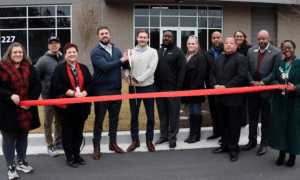Last week a federal judge denied a proposed lawsuit settlement that would have drastically changed how members are elected to the Fayette County Board of Education.
The ruling by U.S. District Judge Timothy C. Batten, Sr. upheld the recent qualifying process for the three school board seats, which means this year’s election will continue to be held at-large and which allows voters to have a say in the outcome of all five seats on each board.
The lawsuit, brought by the National Association for the Advancement of Colored People, seeks to implement district voting for all seats on the Fayette County Board of Education and the Fayette County Board of Commissioners.
District voting would limit voters to casting ballots only for the one seat that corresponds with the geographic district in which they live; they would be ineligible to vote on the other four posts on both boards.
Judge Batten’s May 30 ruling may send the settlement back to the drawing board because it only mustered a black voting age population of 46.2 percent in the largest minority district created by a new BoE district map.
To remedy the lawsuit, established case law requires such a district to eclipse a voting age population of 50 percent among black voters, upheld by a ruling of the U.S Supreme Court, Batten said.
Batten’s decision does not halt the lawsuit, which is still in the discovery phase and is on track to be resolved later this year.
The NAACP contends that the current at-large voting system unfairly prevents black voters from being able “to elect the candidate of their choice.” The suit notes that the county’s black population has sailed past the 20 percent mark, and as such the black residents in the county deserve a special geographic voting district created for both the BoE and county commission.
Last week’s court hearing was the result of a challenge to the BoE-NAACP settlement filed by attorneys representing the county commission, which has contended that the county has not violated the Voting Rights Act as alleged by the NAACP.
The BoE, in contrast, voted in January to approve a settlement with the NAACP that would allow district voting to replace the current at-large voting scheme. The BoE’s vote occurred with scant public notice and no public input on the matter.
NAACP attorney Ryan Haygood argued that even without having a majority of black voters in the “minority” district, the numbers were sufficient enough to likely result in the selection of a black candidate in the upcoming election.
But Haygood could not convince Judge Batten of any legal precedent that would allow him to approve the new “settlement” map with a black resident voting age-population of less than 50 percent.
Haygood said if reaching that threshold was the only holdup for district voting, it would be unfair to ask the citizens of Fayette County, specifically those who are black, to “wait another 10 years” for new results from the U.S. Census.
Haygood argued that with the proposed settlement map, Democrat Laura Burgess, a college professor, would have won a seat on the school board back in 2010. Burgess was defeated in that election, winning 31.5 percent of the vote countywide compared to the victor, Sam Tolbert.
Haygood did not mention that Burgess’ campaign was notable because she never responded to a list of questions submitted to all candidates by The Citizen newspaper, the results of which were published free of charge. Tolbert did respond to The Citizen’s questions, and his answers were published in the paper.
Burgess also declined to file state-mandated campaign contribution disclosure reports during or after the campaign.
Last week’s hearing was merely to rule on the joint motion from the NAACP and BoE to settle the case. Both sides, along with the county’s Board of Commissioners, are still in the middle of the discovery process before the case can proceed to some sort of a final resolution.
The BoE has relied on its contracted attorney, Phil Hartley, to defend it in the case. The county commission has taken a different approach, hiring an Atlanta law firm that specializes in lawsuits evolving from claims under the federal Voting Rights Act.
Hartley told the court Wednesday that for at-large voting to be changed for school board seats, the voters of Fayette County would first have to vote in favor of striking down the constitutional amendment that governs voting for the BoE seats. Judge Batten replied that such a vote would be at-large as well.
In the unlikely event that the BoE’s existing constitutional amendment were struck down, it would then be up to the Georgia legislature to adopt a new law to govern BoE elections in Fayette County, Hartley said.
One interesting wrinkle that may be still in play for the November election is the suggestion in the BoE-NAACP settlement that the district 5 seat currently being held by Leonard Presberg be brought up for a special election since he was appointed by the four other BoE members as required by law to fill a vacant seat due to the death of former board members Sam Tolbert.
While the special election would be contrary to the law controlling board elections, it also would be a potential remedy for the alleged violation of the Voting Rights Act, Batten noted.











Leave a Comment
You must be logged in to post a comment.